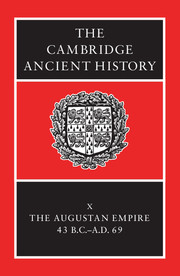2 - Political history, 30 B.C. to A.D. 14
from PART I - NARRATIVE
Published online by Cambridge University Press: 28 March 2008
Summary
INTRODUCTION
With the victory of Iulius Caesar's heir there began – though it is apparent only to historical hindsight – both a distinct phase in the history of Europe, the ‘Augustan Age’, and a distinct epoch in the standard divisions of world history, the ‘Roman Empire’. That fact has always constituted a problem for historians, from the earliest writers about Augustus until now, in that Augustus was both an end and a beginning. The temptation is for chronological narrative to be given up – for time, as it were, to stop – at the beginning of the Principate (whether that be put in 27 or 23 or 19 B.C. or in some other year), giving way to thematic accounts of ‘institutions’ of the Roman Empire as initiated by its ‘founder’. Augustus did, indeed, ‘found’ the Roman Empire; but the danger of succumbing to the thematic temptation is that it makes the institutions he initiated look too much the product of deliberation and the drawing-board, whereas they need to be seen as arising, incomplete and tentative, out of the vicissitudes of a continuing political storv. That story will be told in the present chapter.
The sources of evidence for the reign of Augustus, subsequent to the ‘triumviral’ period narrated in chapter 1 above, are too multifarious to be described generally here, yet in some ways they are far from satisfactory all the same, and the Augustan beginnings of many institutions of the Roman Empire remain hard to detect.
- Type
- Chapter
- Information
- The Cambridge Ancient History , pp. 70 - 112Publisher: Cambridge University PressPrint publication year: 1996
References
- 18
- Cited by

